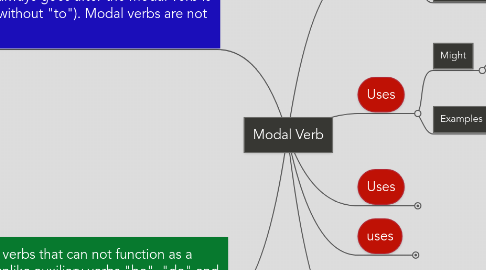
1. As complementary verbs are modal verbs do not work without another word. This other verb always goes after the modal verb is in the base form (the infinitive without "to"). Modal verbs are not conjugated and have no time.
1.1. dog
1.2. Could
1.3. may
1.4. Might
1.5. will
1.6. Shall
1.7. Should
1.8. ought to
1.9. must
1.10. would
2. are auxiliary verbs that can not function as a main verb, unlike auxiliary verbs "be", "do" and "have" that they can function as a main verb.
2.1. Modal verbs expressed mode. They can express ability, possibility, necessity or other status
2.2. They are auxiliaries of the future and the conditional.
2.3. English verb tenses are not enough to express ideas of chance or uncertainty.
2.4. There is no conditional tense in English. Simultaneously, auxiliaries used for conditional. Nor is there a tense and the subjunctive in Spanish. Therefore, it is very important to understand the uses of modal verbs.There is no conditional tense in English. Simultaneously, auxiliaries used for conditional. Nor is there a tense and the subjunctive in Spanish. Therefore, it is very important to understand the uses of modal verbs.
3. Uses
3.1. May
3.1.1. As "could", "may" is used to indicate possibilities in the future.
3.1.1.1. It can also be used to give permission or instructions.
3.1.1.2. In interrogative sentences, the use of "may" is more polite than "can" or "could".
3.2. Examples
3.2.1. i would bring an umbrella, rain May it later.
3.2.2. it May be better to finish esta now, rather than wait until tomorrow.
4. Uses
4.1. Might
4.1.1. "might" is used to indicate possibilities in the present or the future. In these cases, it is synonymous with "may".
4.1.1.1. You can also use as "may", to ask permission or make polite requests, although this use is much more common in the UK than in the United States.
4.2. Examples
4.2.1. i would bring an umbrella, rain Might it later.
4.2.2. it Might be better to finish esta now, rather than wait until tomorrow.
5. Uses
5.1. Can"
5.1.1. suggests ability or possibility. In these cases it can be translated as "power" in Spanish.
5.1.1.1. In interrogative sentences, the use of "can" may request permission or inquire about possibilities.
5.2. Examples
5.2.1. I can speak five languages
5.2.2. We can work late tonight if you need us
5.2.3. Bill and Tom can not help you
5.2.4. The restaurant can be expensive if you drink a lot of wine
6. uses
6.1. Could
6.1.1. "Could" is the past of "can"; It indicates possibility or ability in the past
6.1.1.1. You can also use "could" to future possibilities.
6.2. Examples:
6.2.1. Could Joe speak Spanish When I was young.
6.2.2. i Could not sleep last night
6.2.3. it Could have been worse
6.2.4. Could you play an instrument When you were a child?
7. Uses
7.1. Will
7.1.1. As we have seen, "it will" is used to form the future tense.
7.1.1.1. Also the use of "will" means will or determination.
7.1.2. "it will" is used in interrogative sentences to ask for information, a favor or options.
7.2. Examples:
7.2.1. i will help you
7.2.2. We will learn Inglés.

